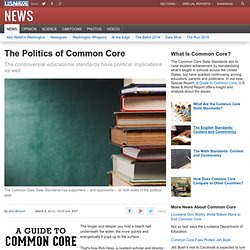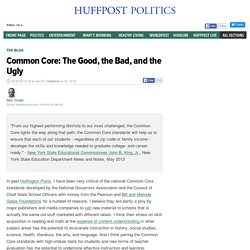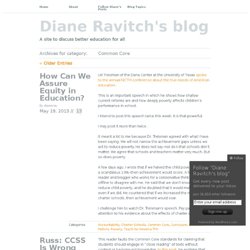

The Politics of Common Core. The longer and deeper you hold a beach ball underneath the water, the more quickly and energetically it pops up to the surface.

That's how Rick Hess, a resident scholar and director of education policy studies at the American Enterprise Institute, describes the Common Core State Standards' rapid rise into the forefront of political controversy. [READ: The History of Common Core] While he says the standards themselves emerged from an "absolutely privately and state-led" effort, proponents of the academic benchmarks shot themselves in the foot and didn't do enough to drive a public conversation about what the standards were and why people should get on board. "No one debated it, nobody was really aware of what it meant," Hess says. "This was unusual in that it wasn't at all debated, even though it was big and national in scope, because people were just excited about the chance of being eligible for a chunk of $4 billion. " [DEBATE CLUB: Are the Common Core Standards a Good Idea?] Alan Singer: Common Core: The Good, the Bad, and the Ugly.
"From our highest-performing districts to our most challenged, the Common Core lights the way along that path; the Common Core standards will help us to ensure that each of our students - regardless of zip code or family income - develops the skills and knowledge needed to graduate college- and career-ready.

" - New York State Educational Commissioner John B. King, Jr., New York State Education Department News and Notes, May 2013 In past Huffington Posts, I have been very critical of the national Common Core standards developed by the National Governors Association and the Council of Chief State School Officers with money from the Pearson and Bill and Melinda Gates Foundations for a number of reasons. I believe they are partly a ploy by major publishers and media companies to sell new material to schools that is actually the same old stuff marketed with different labels. I am a big Clint Eastwood fan and I think his career is a good metaphor for Common Core.
Uri Treisman presents 'Keeping Our Eyes on the Prize' at 2013 NCTM Annual Meeting. Common Core. In copying the response of Hart Research, I inadvertently copied only part of Guy Moyneaux’s comments.

Here is his full response: TO:American Federation of Teachers FROM:Guy Molyneux, Hart Research Associates DATE:May 10, 2013 RE:Methodology for Common Core Survey Following are some facts about the methodology for AFT’s recent survey of AFT K-12 teachers on Common Core implementation that may help to answer the criticisms and questions raised by Mercedes Schneider. Schneider’s objections speak to two distinct questions: 1) does the survey reflect the views of AFT K-12 teachers? In fact, it is likely that a survey of all U.S. teachers would report results broadly similar to what we found among AFT members, for reasons explained below.
. • The survey employed a standard sampling methodology, used in countless surveys by many polling organizations. . • A sample size of 800 teachers is appropriate and common. . • The survey sample is demographically similar to the population of AFT teachers.